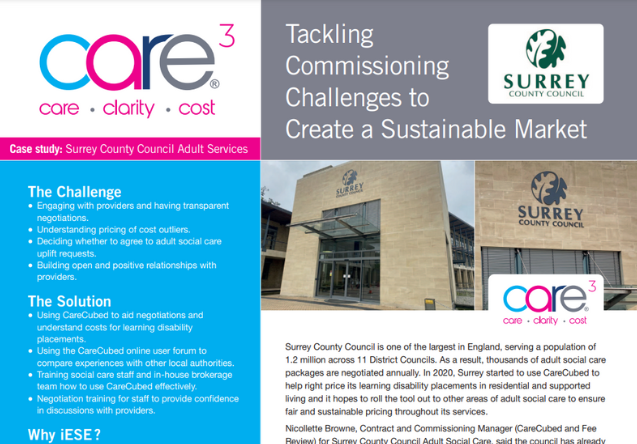
The Challenge
- Engaging with providers and having transparent negotiations.
- Understanding pricing of cost outliers.
- Deciding whether to agree to adult social care uplift requests.
- Building open and positive relationships with providers.
The Solution
- Using CareCubed to aid negotiations and understand costs for learning disability placements.
- Using the CareCubed online user forum to compare experiences with other local authorities.
- Training social care staff and in-house brokerage team how to use CareCubed effectively.
- Negotiation training for staff to provide confidence in discussions with providers.
Results
- Initially used on uplift requests which delivered £272,000 of cost of avoidance. • Assurance based on robust evidence that the council is paying a fair and sustainable rate for care.
- Levelling up the market and bringing all providers in line with fair care costs. • Reducing inconsistency between legacy and newer placement prices.
- Controlling costs from the outset with new placements, reviews and uplift requests.
- Empowering staff, giving them the confidence to question fees and speeding up the negotiation process.
- Connecting with other councils using the tool and sharing best practice and intelligence on care placements and negotiations.
- Consistent use of CareCubed across adults and childrens services to support with transitions.
Surrey County Council is one of the largest in England, serving a population of 1.2 million across 11 District Councils. As a result, thousands of adult social care packages are negotiated annually. In 2020, Surrey started to use CareCubed to help right price its learning disability placements in residential and supported living and it hopes to roll the tool out to other areas of adult social care to ensure fair and sustainable pricing throughout its services.
Nicollette Browne, Contract and Commissioning Manager (CareCubed and Fee Review) for Surrey County Council Adult Social Care, said the council has already looked at between 300 – 400 learning disability cases since the introduction of CareCubed. By the start of May 2022, around 50 social workers in the learning disabilities team and a further 20 staff in the brokerage team had been trained how to use CareCubed for placements for its learning disability cohort.
With the social workers and brokerage team now working jointly on CareCubed, the social work team are filling in the first three sections of CareCubed which relate to care needs, while the brokerage team, which commission the placements, input the information in sections 4 and 5 about the provider. All uplift requests for adult learning disability care are now being routinely run through CareCubed which now plays a key role in the council’s decision-making process around uplifts and provides a greater level of cost control.
Introducing both internal staff and external providers to the CareCubed tool has been a delicate exercise, but one which the council feels was worth it and which all parties now see the benefits of.
“CareCubed is a strong evidence-based tool which allows you to have an open dialog with care providers. For both councils and providers to remain sustainable we need to address the issues head on, and the work we are doing now will mean our residents can access the best possible care in the future.”
Nicollette Browne, Contract and Commissioning Manager, (CareCubed and Fee Review), Surrey County Council
Initially there was some trepidation from providers who were concerned that the introduction of CareCubed was simply a cost-cutting exercise, but these concerns have been allayed with many seeing an uplift: “On a positive note, most of the providers that have worked with us on CareCubed have benefitted from going through CareCubed because they have had increases, but importantly these are realistic and based on local data. Without CareCubed it was very difficult to know whether we were getting value for money and whether the market was sustainable” explained Browne.
While staff members were initially skeptical that CareCubed was just “another thing” adding to their workload, having gone through the training they now feel more adept and confident in negotiating vague or unclear costings as they now have an evidence-based model to assist in those negotiations. “Our staff have found it quite empowering to be able to gently challenge a provider where costings are unclear, and we now know where we stand with all of our placement costs and can plan for the future” she added.
Browne described a very common scenario where Surrey, like almost all councils, could be double paying for services. CareCubed now gives visibility, clarity and the evidence to query the costings and understand how care is being delivered to avoid this duplication. For example, a resident maybe paying for residential care and day care at the same time, or there could be lots of duplicate 1:1 hours paid which are delivered by core staff.
“CareCubed gives us a lot control around costs and commissioning processes, whilst also allowing us to model changes to the market and provision in Surrey. Without a nationally recognised benchmarking tool it was very difficult to know exactly what we were paying for and whether we were being charged a fair price. As a commissioning authority, we have a duty to get value from the public purse whilst also recognising our providers are businesses who need to turn a profit. CareCubed is an invaluable tool to support an open, constructive conversation with our partners.”
Jeremy Taylor, Head of Contracts & Commissioning Support Services and Brokerage, Surrey County Council
“Staff are now confident enough to go back and ask what is included in the core fee because anything that is covered in the one-to-one could possibly be deducted. Before we had CareCubed it was less transparent, so staff have been a lot more positive about using it once they see the benefits it provides to the authority, but also in making their lives easier. As CareCubed is built on an independent evidence-based model used by both commissioners and providers, it has opened up better dialog and allowed us to share our workings with the provider based on the information they have provided us. We can then focus on getting the right care and support for the resident, knowing that CareCubed will give us an accurate price for that placement. The outputs provide a really useful document to share and have a focused conversation with the provider on the needs of individual and any unique circumstances rather than a long drawn out conversation about the cost of cleaning materials for example! Both the LD and Transition team have found it helpful to understand costs and are definitely getting funding agreed quicker and easier because of the transparency CareCubed provides. From a brokerage point of view, it gives us really a strong starting position to negotiate from.”
Browne sees CareCubed as a crucial tool to ensure a fair price is paid for care packages to properly support the market and to deliver value for money from the public purse. There is a lot of inconsistency in pricing of packages without any logical reason – CareCubed allows the council to unpick this and level the playing field. She points out that, firstly, this is a one-off uplift which then right prices the market and allows finance to budget and plan ahead effectively and, secondly, in some cases, placements are under-funded and others they are over-funded. The transparency CareCubed provides means that there is a greater level of control over uplift requests, and CareCubed is updated to keep up with cost-of-living changes amongst other things.
The biggest impact on price is getting the placement right-sized, not the hourly rates or running costs. “I had an example where a provider was asking for £1,500 more for each person and I went back and said ‘for this one it is £300 and for this one it is £86 based on the evidence you have given me’. I thought I would have a battle, but they came back and said ‘okay’. So, what would have been something like £100,000 increase on top of what we already pay was only £20,000. It is an increase, but it is not as catastrophic as it could have been if we didn’t have something to support us in our negotiation. This is a single example and across the volume of cases we have in Surrey, the numbers get very big. Legacy cases might be underfunded, whilst new placements are overfunded to make up the shortfall. CareCubed helps us to understand all of this and readjust to a level playing field, which avoids us having the same difficult conversations due to illogical and inconsistent pricing of placements”, she explains.
Browne said the implementation and support from iESE to embed CareCubed has been very good and explained that iESE held a focus group and made some amendments to the tool because of the council’s feedback, bringing it in line with their requirements. In particular, she feels that the council has benefited from the online user forum which all CareCubed licence holders can attend. “I have linked in with two other local authorities where we are all having the same challenge from the same provider and we are sharing intelligence in terms of confirming that we are all seeing the same thing. Working together is invaluable and adds lots more weight to the conversations” she added.










